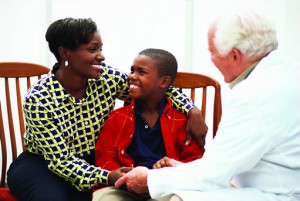
It’s a topic that many are uncomfortable talking about: sexually transmitted diseases. Specifically, human papillomavirus, or HPV. But as awkward as it may be to discuss, it’s a subject that has recently gained national media attention – and rightfully so.
HPV is the most common sexually transmitted virus in the United States, affecting about 20 million Americans with an expected 6 million more to be infected each year.
The Facts about Human Papillomavirus and Cancer
There are more than 100 types of HPV, and about 40 of these can be transmitted sexually. Sexually transmitted HPV can cause some uncomfortable and serious health concerns, including:
- Anal cancer
- Cervical cancer
- Genital warts
- Warts in the throat
Alarmingly, a strain of the virus called HPV-16 has been associated with a recent increase of head and neck cancer.
“The incidence of HPV-associated cancer of the oropharynx [back of the throat, base of the tongue and tonsils] is rising, and 60 to 70 percent of all oropharyngeal cancer cases in Virginia are HPV-associated,” says Paul Read, MD, PhD, associate professor and vice chair of Radiation Oncology at UVA Health System.
HPV and Oral Sex
According to Dyan Aretakis, family nurse practitioner and project director at the UVA Teen Health Center, many teens engage in oral sex in an attempt to practice safe sex, unaware of the risks involved in such activities.
“Teenagers may view oral sex as less risky, and some of them don’t consider it sex at all,” she says. “The truth is that sexually transmitted infections, including HPV, can be passed during oral sex, and this is something people need to be aware of.”
What Can Be Done to Prevent HPV?
Practicing safe sex – such as wearing a condom – is very important for protecting against sexually transmitted infections; however, in some cases, condoms may not fully protect against HPV.
For those looking for added protection, the HPV vaccine is a promising option.
There are two types of FDA-approved HPV vaccines:
- Gardasil – This vaccine protects against four strains of HPV, including the high-risk types associated with cancer of the cervix, anus, head and neck. It also protects against genital warts. Gardasil is approved for use in both boys and girls.
- Cervarix – This vaccine protects against two of the high-risk types of HPV associated with cancer of the cervix, head and neck.
Until 2009, Gardasil was typically offered only to girls. But because the number of girls getting vaccinated is not as high as doctors would like it to be, the Centers for Disease Control’s Advisory Committee on Immunization Practices (ACIP) now recommends routine vaccination for boys as well, to give both sexes a better chance of avoiding HPV. (Cervarix is still indicated only for girls at this time.)
“Vaccination can begin as early as age 9, but the ideal time is at age 11 when children have their well child checks performed by their healthcare provider,” Aretakis says. “Most parents prioritize the 11- and 12-year-old well child check because other immunizations are due at that time as well.”
HPV and Boys
UVA doctor James Turner, MD, supports the ACIP’s recommendation. “I recommend any male up to the age of 26 get the HPV vaccine,” he says. “The vaccine is very safe, prevents genital warts and anal cancer, and likely prevents the transmission of cancer-causing HPV to future partners.”
Early Protection is Key
To some parents, taking their 11-year-old son or daughter to be vaccinated against a sexually transmitted infection seems a little premature. But Dr. Read says that is exactly the time when the vaccine can have the most protective effect.
“The HPV vaccine needs to be given before sexual contact, before the individual is exposed to the virus,” he says. “It is very important for parents to consider getting their children vaccinated at a young age.”
As always, it is important to be as informed as possible before making any decisions about your child’s health. Contact the UVA Teen Health Center, or talk to your pediatrician about the benefits and potential risks associated with the HPV vaccine. UVA students interested in receiving the HPV vaccine can contact the Elson Student Health Center for details.